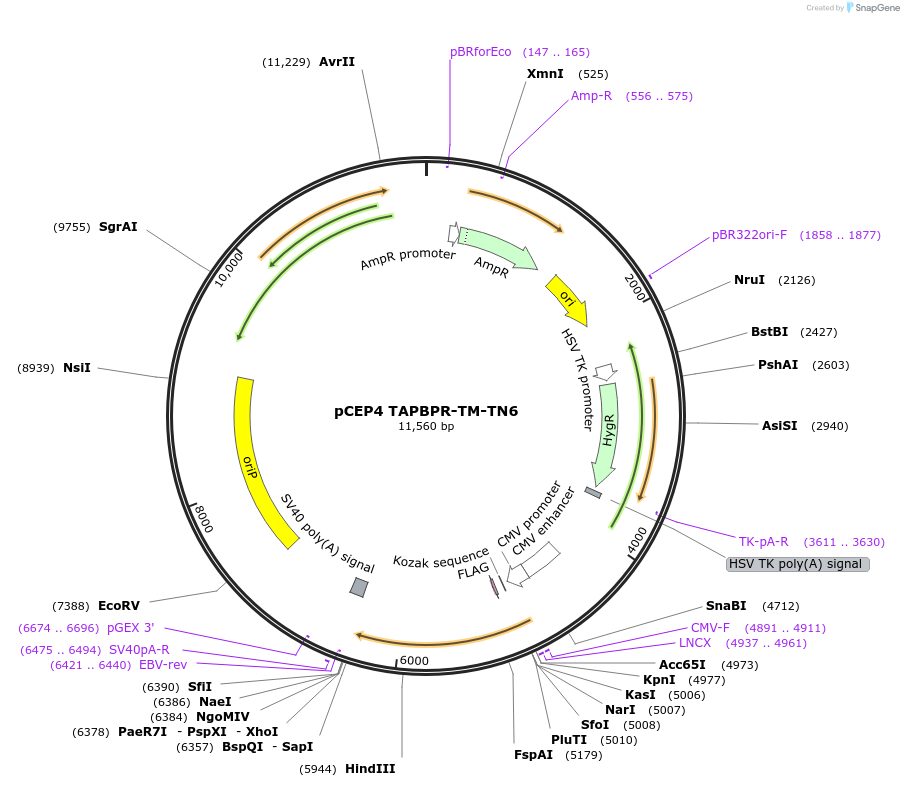pCEP4 TAPBPR-TM-TN6
(Plasmid
#178650)
-
PurposeMammalian expression of FLAG-tagged TAPBPR with MHC TM (E205K, R207E, Q209S, Q272S)
-
Depositing Lab
-
Sequence Information
Ordering
| Item | Catalog # | Description | Quantity | Price (USD) | |
|---|---|---|---|---|---|
| Plasmid | 178650 | Standard format: Plasmid sent in bacteria as agar stab | 1 | $89 | |
Backbone
-
Vector backbonepCEP4
-
Backbone manufacturerInvitrogen
- Backbone size w/o insert (bp) 10381
- Total vector size (bp) 11782
-
Vector typeMammalian Expression
-
Selectable markersHygromycin
Growth in Bacteria
-
Bacterial Resistance(s)Ampicillin, 100 μg/mL
-
Growth Temperature37°C
-
Growth Strain(s)DH5alpha
-
Copy numberHigh Copy
Gene/Insert
-
Gene/Insert nameTAPBPR
-
SpeciesH. sapiens (human)
-
Insert Size (bp)1401
-
MutationE205K, R207E, Q209S, Q272S, switched transmembrane domain with that of MHC-I
-
GenBank IDBC015017.2
-
Entrez GeneTAPBPL (a.k.a. TAPBP-R, TAPBPR)
- Promoter CMV
-
Tags
/ Fusion Proteins
- FLAG (N terminal on insert)
- Signal/leader sequence from HLA class I histocompatibility antigen A-2 alpha chain (HLA) (N terminal on insert)
Cloning Information
- Cloning method Restriction Enzyme
- 5′ cloning site NheI (not destroyed)
- 3′ cloning site XhoI (not destroyed)
- 5′ sequencing primer CMV_fwd
- 3′ sequencing primer EBV_rev
- (Common Sequencing Primers)
Terms and Licenses
-
Academic/Nonprofit Terms
-
Industry Terms
- Not Available to Industry
Trademarks:
- Zeocin® is an InvivoGen trademark.
These plasmids were created by your colleagues. Please acknowledge the Principal Investigator, cite the article in which the plasmids were described, and include Addgene in the Materials and Methods of your future publications.
-
For your Materials & Methods section:
pCEP4 TAPBPR-TM-TN6 was a gift from Erik Procko (Addgene plasmid # 178650 ; http://n2t.net/addgene:178650 ; RRID:Addgene_178650) -
For your References section:
TAPBPR employs a ligand-independent docking mechanism to chaperone MR1 molecules. McShan AC, Devlin CA, Papadaki GF, Sun Y, Green AI, Morozov GI, Burslem GM, Procko E, Sgourakis NG. Nat Chem Biol. 2022 Jun 20. pii: 10.1038/s41589-022-01049-9. doi: 10.1038/s41589-022-01049-9. 10.1038/s41589-022-01049-9 PubMed 35725941



